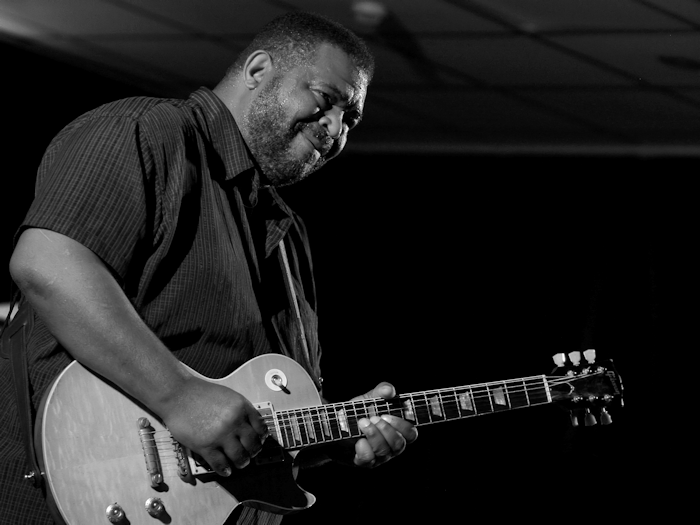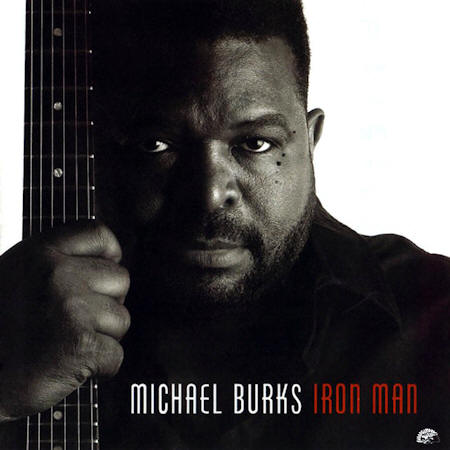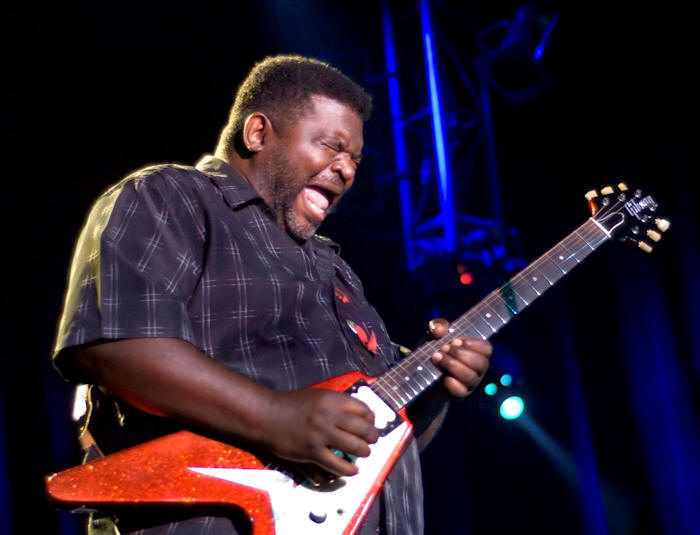
Painting © 2004 Loz
Arkle
Website
© Copyright 2000-2011 Alan White - All
Rights Reserved
Site optimised for Microsoft Internet Explorer
Early Blues Interview
|
|
A fierce, flamethrower guitar slinger and an
exciting, soulful singer. His music has a phenomenal power" "Arkansas-based blues guitarist/vocalist
Michael “Iron Man” Burks toured Europe and the UK in November 2010. performing songs from his
Alligator Records CDs, "Iron Man", "I Smell Smoke" and "Make It Rain".
Boasting remarkable natural talent and deep-rooted soulfulness, Burks’
music is driven by an intense, blue collar work ethic that has earned
him well-deserved national recognition, making him one of the blues
world’s fastest-rising stars. Burks’ powerful presence, inventive and
riveting guitar work and soul-shaking vocals make him the torchbearer of
electric blues guitar heroes. His instantly identifiable guitar sound
and his live charisma have already earned him four Blues Music Award
nominations. Burks’ first Alligator release, MAKE IT RAIN, was named as
one of the Top 200 greatest guitar recordings by GuitarOne magazine. In
2006, the Delta Cultural Center awarded Burks the prestigious Sonny
Payne Award for Blues Excellence, presented each year to an individual
or individuals who have strongly influenced blues music in Arkansas".
I caught up with Michael Burks at the Carlisle Blues Festival, being one of only two gigs in the UK on his 2010 European tour.
Michael: Well, I wouldn’t say I always wanted to become a musician. I was raised up around music, my father played, both my brothers played, it was just like music was around the house all the time. Alan: Your father, Frederick, was a passionate blues man, a steel worker by day and a bass player at juke joints by night? Michael: Yeah, that’s right. He did what he had to do to feed a big family. He worked in construction during the day and worked the clubs at night. Worked two jobs. Alan: Did he encourage you into music when you were a youngster? Michael: Yes, when we showed interest in playing he bought us instruments. But he was strict about it, he said if I spent money buying instruments then we had to learn how to play. Can’t waste money on instruments if you’ve not going to play. Alan: In the early 70s your father had a hand injury at work and the family moved to Camden, Arkansas, and you built the Bradley Ferry Country Club. Michael: That was the third club we had, it was the biggest and best club we owned. We operated it for several years. Alan: And you were the leader of the house band. Michael: Yes, I was in the house band, 4 nights a week. It was a great place. Alan: What sort of music were you playing there? Michael: Mostly R&B, a funk-band, soul and then later at night, you know one or two o'clock in the morning we’d play blues, everybody by then had got toasted and we’d play blues; but mostly we’d play everything that was on the juke box. That’s how you’d get the crowd by playing the latest stuff.
Michael: No, I quit playing completely for about 11 years back in the mid 80’s up to ’93 or ’94 except for a bit of messing around, jamming. Alan: I believe that you produced your first CD yourself and it was noted as being one of the best blues debut CDs of the year by Living Blues magazine. Was that all your own material? Michael: Yes, that was all my own material of 12 of my own songs. I wrote them all, it was a homemade CD recorded in a house not even in a studio. It was actually recorded in a bedroom in a house. Alan: It must have been great to get the accolade of best blues debut CD then? Michael: It was, but it was an accident!! Alan: At that time you were awarded the Albert King Award and that must have had special meaning to you. Michael: Yes, I was surprised by that one too. It was a great boost to my career as I was getting back out there playing. When I won the Albert King award I got invited to do some big blues festivals as I'd never played festivals including two of the biggest blues festivals, King Biscuit Blues Festival in Helena, Arkansas and 'Springing The Blues' Festival at Jacksonville Beach, Florida. At the time Chicago was the biggest, Helena was the second and Florida was the third. They all had over 100,000 people. Alan: Was it about 2001 when you had your first European tour: Holland, Germany, Switzerland? Michael: 2001? No, I’d come to Europe first back in the ‘90s. I've been coming to Europe for a long time. Alan: But never England? Michael: No, never England. I started to coming to play in Holland, Germany, Switzerland back in the ‘90s.
Michael: You've got to put hard work in to get something out of it. It don’t come easy. I do a lot of miles and there’s a lot of sleepless nights. Being away from home and being away from the family, a lot of guys think they can go out and do six months on the road and then six months at home and they’re going to be a superstar overnight. Some of ‘em get lucky but it you ain’t out there in the public eye and in front of the faces how are you going to build a fan base, how are you going to build your name, how are you going to push your records, your songs? They very easily tend to forget about you if you're not out there. Alan: Who’s inspired you the most in your music writing? Michael: That’s easy! Three divorces, women, women and women. Alan: That's a good quote! [Laughter from the band!]. Alan: Are there any songs you play that have special meaning to you? Michael: Well they all do. If they don’t have meaning what’s the purpose? I try to write something about what I’ve been through and I think somebody else may have had the same experience. It’s out there, just like story telling. That’s what I consider myself, as a story teller with music behind me. The more stories I tell, the more dates I get to play and get more popular. I try to tell a good story. Alan: What does the blues mean to you? Michael: The blues have meant a lot to me for the last 53 years. That’s what I’ve basically been doing and it’s been part of my life since I was born and will continue to be a part of my life. Actually blues is a part of everybody’s life whether they want it to be or not, whether they think it is or not. Blues is a fact of life, everybody gets the blues. All blues is the experiences that one person goes through in his lifetime. You’re gonna have good times and you’re gonna have bad times.
Alan: Tell me about the band, when did you all get together? Michael: This band was assembled back in 2000 or 2001 and everybody has been here for the last 8 to 11 years except the bass player and he’s been here going on a year. So these guys now are like a family band because we’ve been together a long time. We did our first record together on Alligator Records a couple of years ago, The Iron Man Album, and we’re going to work on our next album with them too. Alan: Do you like mixing large venues on tours with small ones? I believe you were at a small venue in Wrexham last night. Michael: I still play small venues, not too small, but you still get to take the blues back to where it started from. It didn’t start in Carnegie Hall or big concert halls or big stadiums, it started in juke joints. I built my name from the ground up, you’ve got to start from the bottom and work your way up to the top but you can’t forget about the little people. Alan: I know how pleased the organiser was at Wrexham that you were going to go there. Michael: And we put the same effort into playing a small club as we do for larger stadium. It doesn’t matter if it’s 200 or 2000 people and we put on the same show. Alan: You’ve been to Europe several times, how does the blues compare in Europe with the States? Michael: At home they have a tendency to be able to get it any time but over here they have a tendency to appreciate it a little bit better. Most of the shows here are packed and sold out. We have good shows at home, we have a good crowd because we’ve built a good fan base. It takes work to do that and that’s why we are out 200 nights a year. When you’ve build a good fan base it don’t matter where you are, you can go and play in an out-house and you’re still gonna have a crowd.
Michael: I hope the fan base gets wider and people still go out and support not only the bands but also the venues. If you don’t support the venues they go away and there ain’t a place to play in. Alan: I believe you had trouble in London this week. Michael: We have the same problem in the States. We just played at a club which has been open for years called Blues on Grand and it’s recently closed. We played the next to the last show, it was sad. The guy running the place is a great man and he did everything he could possibly do to keep that place open. It was a great venue, he brought all the touring bands through there. We had a great show there. Alan: And what of the future? You said you had a new CD on the way? Michael: We’re working on one now, writing songs and creating material. I like to try to get many original songs not going back and recording something that somebody’s already done 20 times already, I like to try to do something fresh. Alan: Are we likely to see that early in 2011? Michael: Hopefully, yes. Bruce [Alligator Records] is actually on tour and we’re trying to collaborate on songs right now and get some material together. Once we get some songs together and decide which way we want to go with the album it won’t take long to record it. This band here, we’ll go to a studio for 2 or 3 days and we’ll record enough stuff to make an album and a half. Alan: Well, thank you very much Michael.
Michael performing his first ever gig at the Goin' Up the Country Blues and Roots Club, Overton on Dee Village Hall, Wrexham on 12th November 2010 (Michael Burks: Vocals and Guitar - Wayne Sharp: Hammond Organ and piano - Oscar Huguet: Bass Guitar - Chuck "Popcorn" Lowden: Drums) ....
Michael performing at the Frederickshavn Blues Festival 2010, Denmark ....
Michael at the same festival in 2009 ....
Man, he can play that Gibson guitar!!
Check out photos of Michael Burks at the Carlisle Blues Festival
Return to
Blues Interviews List |









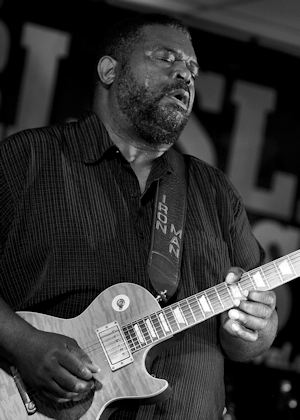 Alan:
Did you always want to become a musician?
Alan:
Did you always want to become a musician?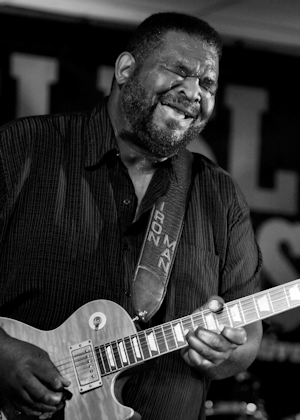 Alan:
When the club closed you took a day job for many years. Did you play
blues at the weekends?
Alan:
When the club closed you took a day job for many years. Did you play
blues at the weekends?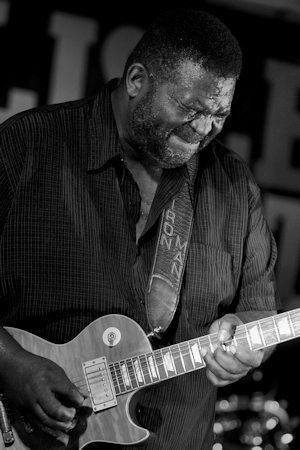 Alan:
You’re known as the 'Iron Man' because of your “long hours of
physical performances” and “fearsome guitar playing” and you travel
thousands of miles on tour every year. You must enjoy the hard work?
Alan:
You’re known as the 'Iron Man' because of your “long hours of
physical performances” and “fearsome guitar playing” and you travel
thousands of miles on tour every year. You must enjoy the hard work?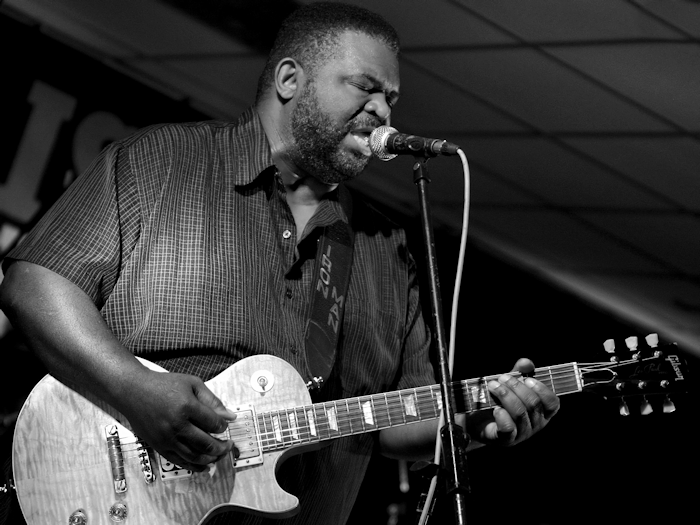
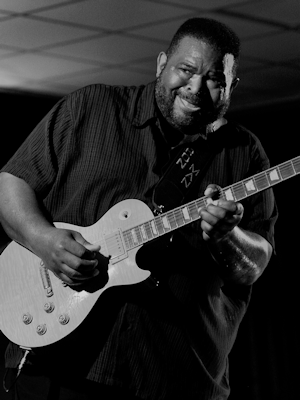 Alan:
Where do you see the future of blues music?
Alan:
Where do you see the future of blues music?